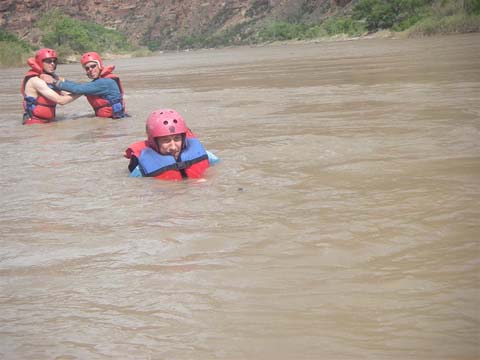Wilderness Medicine Elective
The Curriculum
The course is organized into three different parts or “evolutions”: alpine, swift water, and desert. In each environment we teach how to travel and live in that setting while maintaining safety and comfort. We believe that, in order to be able to care for patients in a wilderness setting, you must first understand how to care for yourself, to quote the pre-hospital provider maxim: “a dead rescuer saves no one.” We then learn about medicine that is specific to that environment via daily lectures by faculty and students (each student prepares and gives one lecture with faculty guidance) and scenarios designed to reinforce topics covered in the previous days.
Wilderness travel skills that are covered include (but are not be limited to): ice axe/crampon use, climbing techniques, avalanche awareness/avoidance, topography/orientation, boat-based/swift water rescue, and drinking water management.
Medical topics to be covered will include: altitude, hypothermia, frostbite, orthopedics of the upper and lower extremities, lightning injuries, submersion, wound care, traveler’s diarrhea and water treatment, eye injuries, heat injuries or burns, and stings and bites. There is significant one on one teaching as well as realistic mock scenarios that utilize students, faculty, and river-guides as patients which incorporate moulage and other tools.
The Calendar
When: The course runs for 3 weeks during the spring semester. Given that we are together 24 hours a day for 3 weeks, we actually get more teaching time into a 3 week course than you would usually find in a 4 week elective.
The 2012 Elective dates are April 27 - May 16 or 17, 2013.
Students fly into Salt Lake City; here we congregate, have a day of lectures and prepare. Preparation includes packing bags for the first evolution, storing gear for the other evolutions, and readying to hike out.
Alpine Evolution: The alpine evolution lasts approximately 6 days and takes place on the flanks of Mt. Pfeifferhorn in Red Pine Canyon. Red Pine is a side canyon of the Little Cottonwood Canyon in the Wasatch Range. This will be the most difficult/strenuous portion of the trip as we portage all supplies for the week (except water which we boil from snow or obtain from a water source). While this is not easy, everyone will be capable of doing it, as mentioned previously one goal of the course is to involve all members of the group regardless of experience or ability.
Water Evolution: The water portion is 5 days of rafting on the Green River in Desolation Canyon (it’s much better than the name implies, really). This part is guided by a professional service but still features teaching by our faculty.

Break: We then spend 2 days in Moab, UT. This time is used to reorganize from the water evolution and prepare for the desert evolution. For the desert evolution, students are expected to work together to plan a menu and purchase necessary supplies. The time in Moab also allows students to experience a few of the numerous activities in the area: mountain biking, road biking, hiking, rock climbing, off-roading, etc.
Desert Evolution: This is a 4 day segment in the Needles section of Canyonland National Park. In the desert we camp in groups of 10 or less that are each a mile apart in order to minimize impact on the fragile environment. Daytimes in the desert are largely spent reading or relaxing to avoid the intense heat. Group learning activities and hiking occur early or late in the day when the temperature is cooler.
Faculty
Course Director: J. Matthew Sholl, MD – Maine Medical Center, Director of EMS, UVM Associate Professor of Emergency Medicine.
The course is taught by faculty of Mountain Aid Training International (MATI) who have experience with hiking and traveling internationally as well as teaching wilderness medicine. MATI teaches wilderness medicine to the first responder level, wilderness EMT level, college courses, and medical school courses.
Cost
Back to Wilderness Elective Main